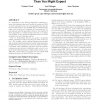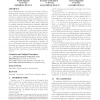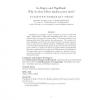667 search results - page 104 / 134 » Context-Dependent Term Relations for Information Retrieval |
155
Voted
SIGMOD
2007
ACM
15 years 9 months ago
2007
ACM
To compensate for the inherent impedance mismatch between the relational data model (tables of tuples) and XML (ordered, unranked trees), tree join algorithms have become the prev...
82
Voted
ICDE
2009
IEEE
15 years 4 months ago
2009
IEEE
Abstract— It is widely realized that the integration of information retrieval (IR) and database (DB) techniques provides users with a broad range of high quality services. A new ...
KDD
2006
ACM
15 years 10 months ago
2006
ACM
Several algorithms have been proposed to learn to rank entities modeled as feature vectors, based on relevance feedback. However, these algorithms do not model network connections...
81
Voted
MM
2010
ACM
14 years 10 months ago
2010
ACM
The vast user-provided image tags on the popular photo sharing websites may greatly facilitate image retrieval and management. However, these tags are often imprecise and/or incom...
IM
2007
14 years 9 months ago
2007
PageRank is a popularity measure designed by Google to rank Web pages. Experiments confirm that PageRank values obey a power law with the same exponent as In-Degree values. This ...



